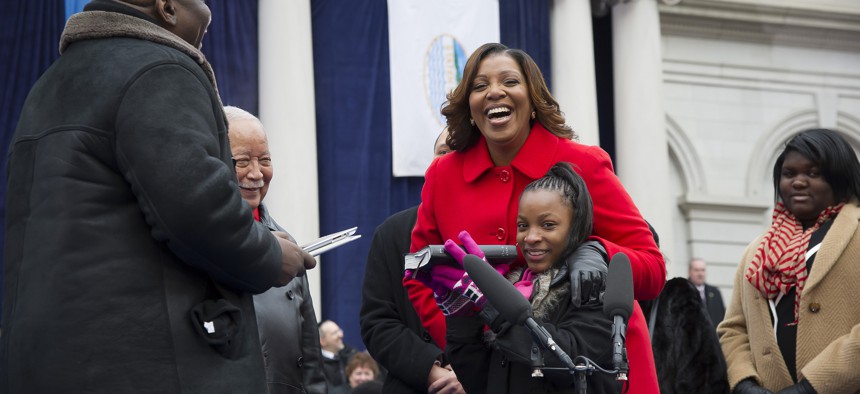A NYCHA Thanksgiving
It was a frigid Thanksgiving – especially for thousands of New York City Housing Authority residents.

New York City Public Advocate Letitia James' swearing in Rob Bennett/Office of the Mayor
It was a frigid Thanksgiving – especially for thousands of public housing residents, as heat and hot water disappeared in a number of New York City Housing Authority developments this past Thursday.
The Grant Houses in Harlem lost heat for more than 24 hours, while Brooklyn’s Brownsville Houses and Cooper Park Houses and Manhattan’s Rutgers Houses, Elliot Houses and Harborview Terraces also lost heat in recent days – adding up to more than 25,000 residents suffering through heating or hot water failures, according to the New York Post.
“It is completely unacceptable that New Yorkers are being denied heat and hot water in their homes during this time of year, especially at the hands of our city,” said New York City Public Advocate Letitia James, the state attorney general-elect. “I am deeply concerned that NYCHA continues to be plagued by such serious and widespread problems that put children and seniors at risk.”
Of course, it wasn’t all bad news on Thanksgiving. About 150 Salvation Army volunteers spent Thanksgiving Day serving meals to the needy at the organization’s Manhattan headquarters, while some homeless New Yorkers found ways to keep their family’s holiday traditions alive.
And while some were focused on finding the best deals on Black Friday, others were keeping the focus on those in need on what has been dubbed “Orange Friday” – the day after Thanksgiving, when advocates say many food pantries and soup kitchens are closed.
Looking ahead to Giving Tuesday, Axios Edge has some advice and information on giving back. First, to put things in context, American households gave $287 billion to charity in 2017, while total giving exceeded $400 billion. One way to go about giving is to utilized GiveWell’s top charity list.
But keep in mind that the Trump tax cuts mean fewer donors will be able to deduct charitable donations. “With the economy remaining robust, more than 80% of Americans are likely to give at least as much as they did last year,” Axios Edge writes. “Then, when it comes time to itemize their 2018 taxes, millions of them are likely to discover that they will receive no tax benefit for doing so.”
NEXT STORY: Hunger remains a big problem in New York City